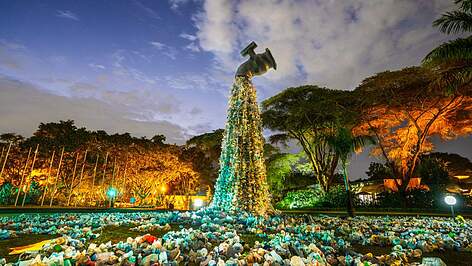A global solution to a global problem
Currently, an estimated 9 - 14 million tons of plastic waste ends up in our oceans every year. Plastic waste has been found in all areas of the globe, from the deepest seas to the most remote mountains. It causes major harm to wildlife and ecosystems, but also disrupts the livelihood of millions of people, as well as posing significant risk to human health and the world economy.
Regulation and voluntary measures at a national level have proven ineffective in stopping plastic from polluting and poisoning our planet. In fact, it is only getting worse. In order to effectively and decisively deal with the plastic crisis, the world needs a new set of common rules and regulations that address plastic throughout its entire lifecycle.
 © Von Wong Productions
© Von Wong Productions
A once-in-a-generation opportunity
In March 2022 UN Member States agreed to start negotiating the content of a new legally binding, global instrument to end plastic pollution. This historic decision is a major leap towards plastic free environments for all. The framework is now being negotiated throughout a series of meetings across the globe, and is expected to be adopted by 2025.
The negotiation of a new treaty on plastic pollution provides a unique opportunity to unlock systemic change across the global plastics economy by ensuring states abide by common, high-impact measures and holding them accountable if they fail to do so.
The crucial next phase
The second negotiation meeting, INC-2, took place in Paris between 29th May and 2nd June 2023. Despite a series of delays in the first half of the week, nations agreed to develop a first (‘zero’) draft of the treaty text to be published ahead of the next negotiations.
The negotiations in Paris saw a large majority of governments actively calling for a set of specific and comprehensive binding global rules across the plastic life cycle as well as global bans on high-risk plastic products, such as single-use cutlery, cigarette filters and microplastics in cosmetics. These are plastics that are more prone to end up in our environment and cause the most harm once there.
The third negotiation meeting will take place in Nairobi between 13th and 17th November 2023 where delegates will discuss and debate the contents of the ‘zero’ draft of the treaty. In the lead up to the third negotiations, we expect to see:
-
Intersessional sessions’ to progress talks on key measures, including core obligations and means of implementation.
-
Submissions from Governments and observing organisations
-
The publication of the ‘zero’ draft in October.
EU member states commit at ministerial level to work for a new global agreement against plastic litter.